| City Residents Speak Out
One evening in early April, residents of Winter Park’s Westside showed up in force at City Hall. In a strong showing of neighborhood solidarity, Westsiders attended the April 8 Planning and Zoning (P & Z) meeting to oppose another attempt by developer Dan Bellows to change the character of their neighborhood.
The neighborhood’s forceful response was triggered by a request from Bellows to modify City regulations to transform a group of single family residential lots into a high-density, high-priced residential development.
Denning Area Neighborhoods On Edge as Fear of Encroachment Spreads
Winter Park residents in other neighborhoods near Denning Drive are also becoming concerned about the impact of area development on their neighborhoods. Mary Randall, who lives on Kentucky Avenue near the proposed baseball stadium — just off Denning Drive — urged the city to reconsider its stance on area development:
|
“There’s so much at stake here . . . We are a small town . . . You’re turning this into something that no one envisioned it to be . . . When will it end? When will we stop taking away our single family neighborhoods?”
–Mary Randall, WP Resident Since 1987 |
|
Mayor Bradley has characterized Denning Drive as a “Hot” development corridor. Bradley has been generally supportive of developer initiatives that have put city residents on edge. Bradley’s employer, Florida Hospital, has made large investments in hospital-related development throughout Central Florida.
City Too Cozy with Developers?
Westside residents have long decried what they see as a too-cozy alliance between the City and developers — an alliance that is transforming their historic family neighborhood into a target-rich development zone for profit-seekers. Two of the highest-profile proposals recently considered by the City are the Lee Road Cut-Through on one end of Denning and the Rollins/Manatees Baseball Stadium on the other. Wealthy backers of the Stadium project are working with the City to tap taxpayer dollars that are earmarked for redevelopment of the Westside. There is strong support inside City Hall for the Stadium and the Cut-Through.
Residents: Enough!
Westside residents and those from nearby neighborhoods have recently begun to organize resistance to projects like the Cut-Through and the Baseball Stadium. Recent hearings and community meetings have been roiled by strong protests by citizen groups.
Westsiders, who have, for years, lived with the threat – and the consequences – of City-enabled development, are leading the way for other neighborhoods who feel that new and proposed development may gridlock their city streets, crowd the skyline with towering buildings and permanently degrade their quality of life.
Has City Abandoned Its Community Plan for Affordable Neighborhoods?
In 1999, A Westside Community Plan entitled “A Report by the Westside Neighborhood Housing Task Force, 1998-1999” outlined what the community wanted to see in the 21st century. One of the goals stated in the report is “To increase the desirability and variety of residential housing opportunities for Westside residents by rehabilitating existing, viable dwellings, refining the city’s Affordable Housing Program and by attracting market-rate residential development that would be appealing to moderate-income families. The needs of current residents, including elders, shall be a priority.” (page 8 “Moving into 2000: Westside Community Plan).
Fourteen years into this century, some of the goals have been achieved, but the vision to preserve affordable single family homes may be fading. With the nation’s economy now emerging from a period of stagnation, developers’ requests to transform this neighborhood are now high on the agendas of the Planning and Zoning Board and City Commission.
Low-Density, Low-Traffic Community Plan Undermined by Developer Interest in More Profitable Higher-Density “Products”
Rather than regarding this section of Winter Park as preserved for affordable housing, some developers see the neighborhood and adjacent areas as a prime location for upscale development “products” that would appeal to a new wealthier clientele who want to live close to downtown Winter Park.
Unicorp, the developer of the new “Lakeside” retail center at Morse and 17-92, also has indicated interest in building a mixed-use (commercial/residential) project between Denning and 17-92 on the site of the Mt. Vernon Motel.
Casto Properties, developer of Winter Park Village, is completing construction of a multi-story (200+) luxury apartment complex (including parking garage) on Denning next to the Village — and is reportedly eyeing the VoTech property on Denning next to the proposed Lee Rd. Cut-Through.
Bellows Moves to Revise the Comp Plan
Developer Dan Bellows’ April 8 request to change the Comprehensive Plan to allow rezoning and consolidation of 8 lots from single family residence (R-1) to high density multi-family homes (R-3 and R-4) would affect land on the Westside bordered by Canton, Capen, Swoope and Denning.
If Bellows’ request is granted, the allowed density would increase from 8 free-standing single family homes to something between 20 and 32 attached units. Although the exact number of units has gone back and forth during discussion, if the project is approved, the end result would significantly change the character of that part of the Westside.
(Click video image above for Part 1 of P&Z hearing. Click video images below for Parts 2 & 3)
The proposed changes would require the City to make three revisions to the Future Land Use Policies in the Comprehensive Plan. Policy 1-3.8.4 states, “The City shall encourage single family detached homes as opposed to apartments and condominiums by strongly discouraging Future Land Use Map amendments.”
Bellows’ Sydgan Corp. has requested this provision be amended to read, “unless such development is abutting (“abutting” shall include property separated by a right-of-way or alley) or within 100 feet of a parking garage or commercial building.” Bellows built a parking garage on the adjacent property in 2007. The Atlantic Housing Senior Living Facility — a commercial rental property — also sits on the bordering property.
Comprehensive Plan Policy 1-4.1.H-3 reads: “This policy is a part of Planning Area H: Hannibal Square Neighborhood. Restrictions on Multi-family Development. The City shall strongly discourage Comprehensive Plan Amendments from Low-Density to Medium-Density or High-Density Residential Future Land Use Map designations.”
Rather Than Deny Bellows’ Request, City Staff Recommends High-Density Compromise
When Director of Planning Administration Dori Stone explained these requests to the P&Z Board, she reported that the staff had recommended a compromise. City staff thought building a single family home next to a parking garage would be “a hard sell,” so they recommended the property adjacent to the garage be rezoned to R-3 rather than R-4, and that a “step-down” approach in height requirements be allowed — three-story buildings “in the shadow of the garage,” but stepping down to two-story R-2 zoning along Canton and maintaining the R-1 zoning along Capen. In this scenario, density would change from 8 single family homes to 20 townhomes (P&Z video part 1 – 6:00).
Bellows Claims Garage Justifies Comp Plan Revisions — Westside Residents Disagree
During the April 8 hearing, Westside residents argued that the presence of the parking garage in no way justified the proposed changes. Canton Avenue resident Mary Daniels explained that the parking garage replaced single family homes (P&Z video part 2 – 21:05) asking, why, when there were single family homes on the properties, did the current R-1 zoning not prevent the approval of the garage?
Linda Walker Chapell strongly criticized the City for considering Bellows’ request saying “The staff recommended that this property . . . be allowed to have a zoning change because of the garage . . . We didn’t want that garage . . . We told [ the City ] that we didn’t want it.”
Bob Cambric, a former Westside resident who earned a Master’s Degree in Urban & Regional Planning and has 25 years’ experience in the field, spoke on behalf of his hometown neighbors. He argued the City should not alter its Comprehensive Plan in this piecemeal fashion. He said, “Winter Park is one of the best planned communities of the 472 cities in the state of Florida. You have a plan that has gotten you there.”
Cambric explained that the policies in place are there to protect the Hannibal Square Community, but if the proposed changes are approved, the City must abandon those policies. (P&Z video part 2 – 00:00)
A source close to the development community told the Voice that developers have interest in building multi-story town houses on Canton all the way from Denning to Park Ave.
Developer’s Westside Story: We Want to Build $500,000 Townhomes
— Single Family “Doesn’t Work” For Us
In an attempt to gain P&Z board support for his proposed development, Mr. Bellows’ called on Kevin Kramer, a representative of David Weekley Homes, to describe the “product,” that is, the type of home they intend to build.
Although Kramer did not show any elevations or images of the proposed “product”, he explained that feedback they have received from realtors is that high-density attached townhomes would appeal to empty nesters who would like to live near the Winter Park Village and the downtown area. They have planned accordingly for a series of 2,000- to 2,500- square-foot town homes, each with a two-car garage, in the price range of $400,000 to $600,000 (and up). (P&Z video part 1 – 41:11).
P&Z Tells Bellows & Westsiders to Resolve Differences
In response to community opposition, the P&Z Board concluded the meeting by tabling the proposal and directing the interested parties to meet to discuss their issues. P&Z board member Tom Sacha asked the residents to develop an alternative to Bellows’ plan so that the property in question does not remain vacant for an indefinite period of time. Mr. Bellows promised to attend and to bring illustrations/elevations showing the townhomes he wants to build.
Westside Holds Meeting to Discuss Differences: Bellows a No-Show
A special meeting between Dan Bellows’ Sydgan Corp. and Westside residents was held on April 24 at the Winter Park Community Center.
Westside residents attended — along with Dori Stone and Jeff Briggs from the City. Mr. Bellows, however, did not attend. Instead, he sent his lawyer and the representative from David Weekley Homes to represent him. His representatives did not have the drawings of the proposed townhomes Bellows promised. Bellows’ failure to appear and his failure to produce the promised drawings angered Westside attendees.
Bellows Submits a New Plan
At a subsequent April 29 P&Z Board work session, Ms. Stone reported that Bellows had submitted a new set of plans. She made it clear, however, that in light of the community’s strong opposition to any departure from R-1 zoning, she doubted that Mr. Bellows’ new plan would mitigate Westsiders’ fear of the impact it will have on their neighborhood.
Requested Comp Plan Revision Could Spell Trouble for Rest of Winter Park
If Bellows’ request is granted, revisions to the Comprehensive Plan would be permissible wherever a parking garage is built. For instance, if a parking garage were added to the YMCA facility on Lakemont, the Comp Plan changes requested by Bellows could be used to justify the building of high-density townhomes on the properties adjoining the YMCA along Palmer and Lakemont.
If a minor league baseball stadium is approved for Harper-Shepherd Field on Denning, City officials are planning to fund a parking garage as part of the stadium project. Mr. Bellows’ requested Comp Plan changes could open the door to developer interest in building similar high-profit, high-density housing “products” near a new stadium garage – a scenario envisioned by Urban Planner, Bob Cambric. During his testimony at the April 8 P&Z hearing, Mr. Cambric asked: “Who else’s neighborhoods are going to be in jeopardy because they happen to have a parking garage nearby?”
“Which side are you going to be on?”
Another Westside resident asked P&Z board members: “When is it going to stop?” As she named streets in Winter Park’s wealthier neighborhoods, she asked board members to consider how they’d feel if multi-family projects were built in their neighborhoods. She then appealed to the board to communicate citizen concerns to the City Commission, concluding: “We all live in Winter Park . . . It’s not a matter of the Haves or the Have-Nots. I ask which side are you going to be on?” |

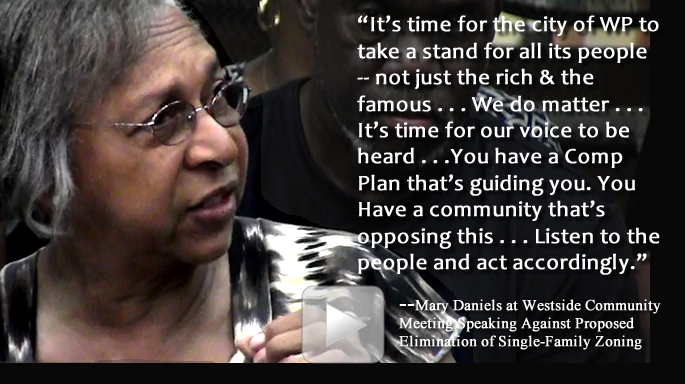
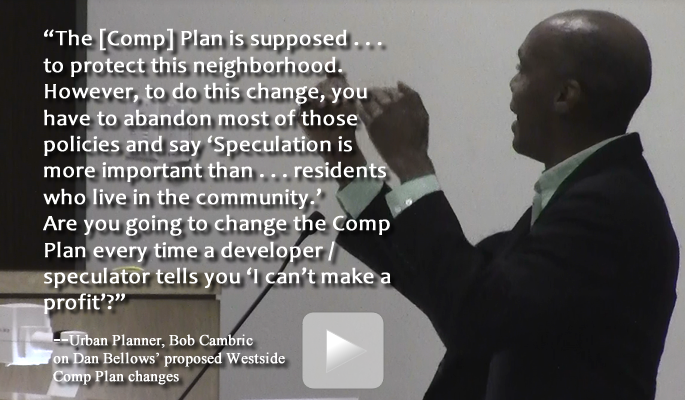
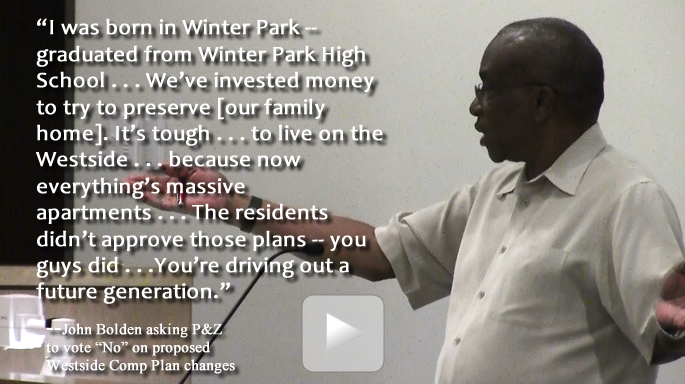
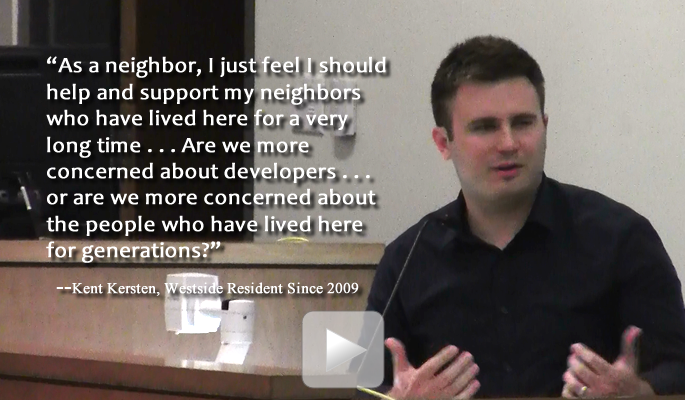
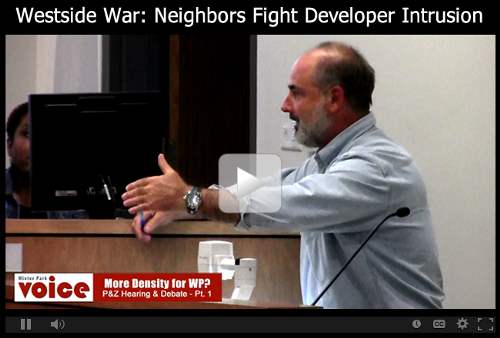
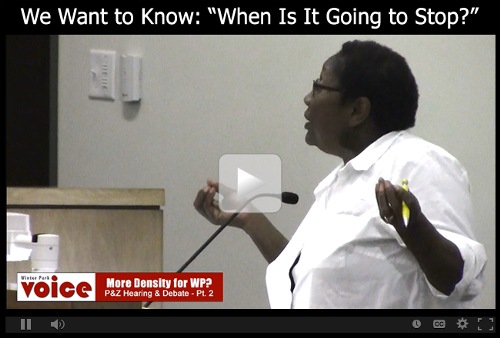
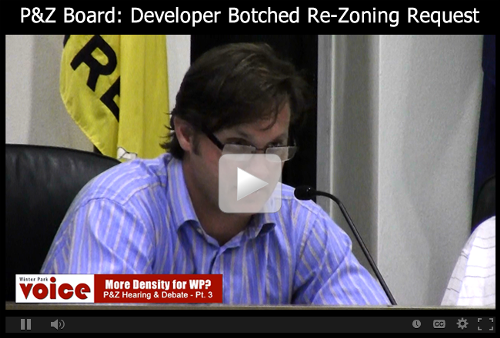
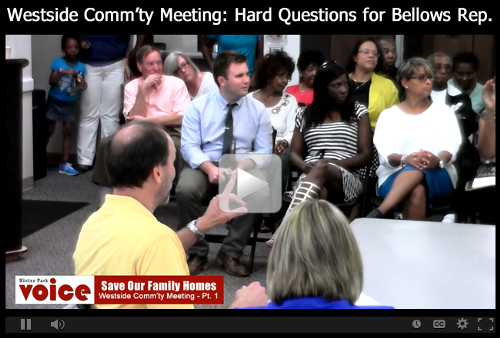
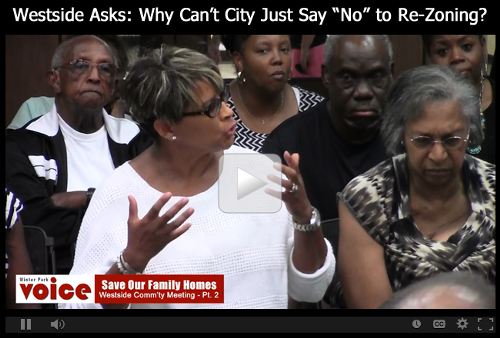
Recent Comments